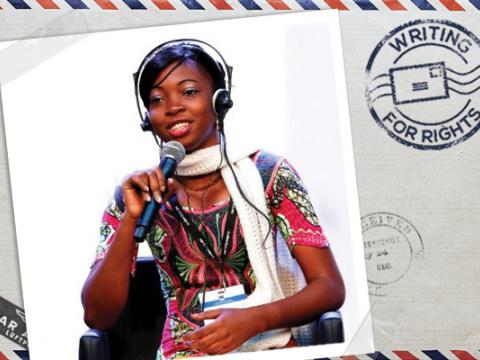Writing for Rights: Jenny, 16, Democratic Republic of Congo

DO WE REALLY HAVE WHAT WE SHOULD HAVE?
It was a certain 16 January 2009, when I was almost 9 years old, that I learned for the first time during an awareness campaign for children in my school organised by UNICEF that a child also has RIGHTS. Personally, this sounded very strange to me as the child in my culture and my community has always been considered as a human being who has no opinion or point of view to express and is supposed to exclusively obey all the demands of his parents and other family members.
Since then, a new way of life was born inside of me, the way of wanting to know enough on the provisions of the protection of the child, including the Convention on the Rights of the Child (CRC), and to understand them. This perfect understanding of the rights of the child as mentioned in the CRC has positively influenced me in order to sound the alarm, speak out and never remain silent where the rights of the child are violated in my community.
This commitment is the reason why I joined the Children’s Parliament (PARDE) in 2011, but also the drive that pushes me to write today in order to compare between the commitments taken by my country, the DRC, by ratifying the CRC and the true realities of everyday life of the Congolese child 25 years later.
A new way of life was born inside of me, the way of wanting to know enough on the provisions of the protection of the child, including the Convention on the Rights of the Child, and to understand them.
It sickens me greatly to find every day on the streets of my town of N’sele, the village of Kinshasa, hundreds of children aged 6 to 17 who are economically exploited by selling water in packets called Mayi, Chikwangue, vegetables and different objects; others are working hard, under the sun and during the day, in sand and gravel extraction sites and in mineral deposits (in Katanga). These are children for whom schooling has no meaning any more since they already know the taste of money and work for the survival of their families, are deprived of their right to education (art 28, CRC) and are completely unprotected against risky work that is susceptible of harming their health as well as their physical and mental development (art 32, CRC).
It is definite that access to education has improved considerably in my community with the efforts of the government and its partners; however, the free primary education as needed by the CRC is not yet effective all over the country, especially in Kinshasa and Lubumbashi! On the other hand, the quality of teaching given has but decreased (the baseline investigations organised in my community by World Vision proved that only 8 per cent of children who finish primary school can read, write and calculate). In addition,
I regret to note that in the twenty-first century there are still schools in my town and my country where children study even on the ground! It is in vital need that I take advantage of this commemoration of the 25th anniversary of the CRC to remind the decision makers in my country of actually engaging in the improvement of the welfare of the Congolese child, knowing that even our constitution of February 18, 2006, in its article 123, item 16, provides a central place for the child with regards to the development of the human being and life.
This commitment of our government that we are all waiting for is without a doubt one that links the promises to the acts, and that can be expressed, for example, by increasing the budget allocated for the health sector in order to build health and hydraulic infrastructures, establishing a national parliament for children that will be based in one of the two halls of the parliament in order to be consulted in advance on all matters concerning children and provincial parliaments, guaranteeing the free complaint made by a child, consequently sensitising the parents and local leaders on the rights of the child, equally taking into consideration the questions related to the quality of teaching, and stabilising the eastern part of my country because, without peace, no project is possible.
In summary, have the matter of the child who is the future of tomorrow as a priority among all. It is also an opportunity to remind the international community of actually wanting to develop an additional protocol to the CRC on taxable sanctions for all states who have not made the effort to actually implement the rights of the child as ratified.
Jenny, 16-years-old, Democratic Republic of Congo